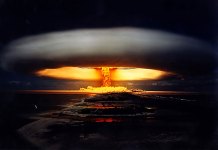Beijing has strongly rejected Indian claims that a detained Pakistan-bound Chinese merchant vessel breached non-proliferation and export control restrictions.
With NASAMS II – New Delhi To Get Multi Layered Air Defence System Like Washington, Moscow
“The Pakistan-bound merchant vessel from China was detained by India, but the autoclave on the ship that India claimed to be material for ballistic missiles is neither military supplies nor dual-use items under non-proliferation and export control,” Chinese foreign ministry spokesman Lijian Zhao said at a media briefing in Beijing.
He said that China, being a responsible country, abided by international non-proliferation obligations and international commitments. Zhao said that the operators of the ship had truthfully declared the cargo to the Indian authorities and, therefore, there is no concealment or false declaration.
What Is The US-India ‘Blue Dot Network’ That Aims To Counter Chinese BRI Initiative?
Earlier, as EurAsian Times reported, India’s customs officials detained a ship bound for Qasim, a port in Karachi, Pakistan for attempting to pass on an autoclave as an industrial dryer. The ship was allegedly carrying a machine that is used to launch ballistic missiles.
An intelligence tip-off about the ship was received by the Customs officials and based on intelligence, it was interrupted on February 3 when it stopped at Gujarat’s Kandla Port during its forward journey from Jiangyin Port in China.
The autoclave which is 18×4 metre in dimension is a pressure chamber that can be used for both civilian and military purposes. The DRDO scientists have found that the autoclave which we are talking about is used to make the composite lining for solid-fuel ballistic missiles.
How Pakistan-Backed Azerbaijan Is Confronting India-Backed Armenia?
The development has worried Indian national security officials because of the connections shared between Pakistan and China. Back in 1989, Islamabad had entered into a contract with Beijing to buy 34 solid-fuel M-11 ballistic missiles. These missiles now form the core of Pakistan’s nuclear capability.




